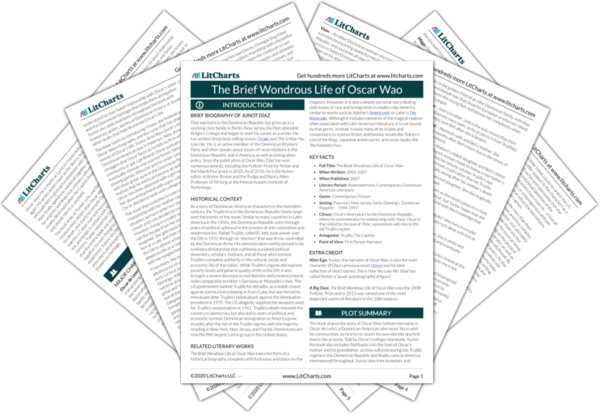While telling the story of Oscar de León, The Brief Wondrous Life of Oscar Wao also references many of the books or movies that the characters have read. Díaz responds to these works and explores the influence that artistic works can have on the real world. These fictional connections then point to the ways that people use the frameworks of fantasy and art as tools to understand their own lives.
Genre fiction features prominently in the novel as an escape for characters who do not want to face some aspect of their real world. Oscar and Yunior use science fiction and fantasy novels to ease their insecurities, while Beli looks to romance novels for the love that she cannot find in the Dominican Republic. Yet, though Oscar Wao acknowledges that literature can provide comfort, it also asserts that it is necessary to maintain a sense of the real world. Oscar and Beli are bitterly disappointed when their fantasies do not come true, while Yunior is able to find contentment with his life only after letting go of the desire to reshape reality. The novel argues that art can supplement life, but that it cannot replace the responsibility of dealing with one’s true circumstances.
Navigating fantasy and reality is further complicated for the characters of Oscar Wao, however, because they often cannot find real role models that display their identities in the fiction that they love. Díaz argues that the fantasy worlds his characters have chosen for themselves are not fully satisfying because these worlds have no room for characters who look and act Dominican. Oscar and Beli only see people who look like them—that is, with darker skin—playing villains in the genres that they love, and Oscar points out that literature created by white authors often upholds racial hierarchies that benefit white people. With Oscar Wao, then, Díaz challenges these hierarchies, both by creating fully three-dimensional Dominican characters, and by using the tropes of historically white genres, like sci-fi and fantasy, in a Dominican story.
Díaz explores the ways that fantasy can make reality easier to handle by imbuing bleak struggles with moral significance and tying together hard experiences into a larger story where good triumphs over evil. However, he also points out how fantasy can make life more difficult for people of color when the stories they enjoy do not include characters like themselves, or lead them to unrealistic or harmful worldviews. Diaz’s solution is not to firmly reject the influence of fantasy on people’s real lives, but to advocate for more diversity in art and literature. With Oscar Wao, Díaz gives an example of the type of fiction he wants, writing a novel in which white people and people of color can all be villains or heroes.
Art, Life, and Latinos in America ThemeTracker

Art, Life, and Latinos in America Quotes in The Brief Wondrous Life of Oscar Wao
You really want to know what being an X-Man feels like? Just be a smart bookish boy of color in a contemporary U.S. ghetto. Mamma mia! Like having bat wings or a pair of tentacles growing out of your chest.

Unlock explanations and citation info for this and every other The Brief Wondrous Life of Oscar Wao quote.
Plus so much more...
Get LitCharts A+The trip turned out to be something of a turning point for him. Instead of discouraging his writing, chasing him out of the house like his mother used to, his abuela, Nena Inca, let him be. Allowed him to sit in the back of the house as long as he wanted, didn’t insist that he should be "out in the world."
You don’t know the hold our mothers have on us, even the ones that are never around—especially the ones that are never around. What it's like to be the perfect Dominican daughter, which is just a nice way of saying a perfect Dominican slave.
Pujols, it seems, had promised Belicia that they would be married as soon as they'd both finished high school, and Beli had believed him, hook, line, and sinker. Hard to square her credulity with the hardnosed no-nonsense femme-matador I'd come to know, but one must remember: she was young and in love. Talk about fantasist: the girl sincerely believed that Jack would be true.
Don’t laugh, mi negrita, for your world is about to be changed. Utterly. Yes: a terrible beauty is etc., etc. Take it from me. You laugh because you've been ransacked to the limit of your soul, because your lover betrayed you almost unto death, because your first son was neverborn. You laugh because you have no front teeth and you've sworn never to smile again.
“Wondering aloud, If we were orcs, wouldn’t we, at a racial level, imagine ourselves to look like elves?”
He read The Lord of the Rings for what I'm estimating the millionth time, one of his greatest loves and greatest comforts since he'd first discovered it, back when he was nine and lost and lonely and his favorite librarian had said, Here, try this, and with one suggestion changed his life. Got through almost the whole trilogy, but then the line "and out of Far Harad black men like halftrolls" and he had to stop, his head and heart hurting too much.
Behold the girl: the beautiful muchachita: Lola's daughter. Dark and blindingly fast: in her great-grandmother La Inca’s words: una jurona. Could have been my daughter if I'd been smart, if I'd been ---. Makes her no less precious. She climbs trees, she rubs her butt against doorjambs, she practices malapalabras when she thinks nobody is listening. Speaks Spanish and English. Neither Captain Marvel nor Billy Batson, but the lightning.
So this is what everybody's always talking about! Diablo! If only I'd known. The beauty! The beauty!











